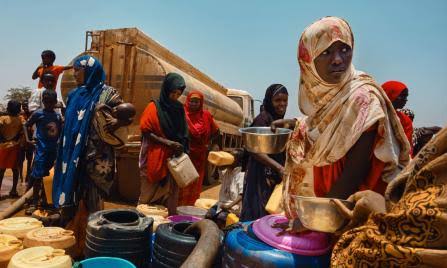Facebook Twitter (X) Instagram Somali Magazine - People's Magazine
The United Arab Emirates (UAE) has delivered 700 tons of food aid to Somalia in a significant humanitarian effort to support families affected by severe drought in the Horn of Africa. This critical aid was handed over to the Somalia Disaster Management Agency (SoDMA) during a formal ceremony attended by UAE Ambassador to Somalia, Ahmed Juma Al-Rumaithi, and SoDMA Commissioner, Mahmoud Moallim Abdulle.
The ongoing drought crisis in Somalia has left millions vulnerable, with widespread food shortages and mass livestock deaths due to water and vegetation scarcity. The UAE’s aid delivery aims to alleviate some of the suffering by targeting the most severely impacted regions across the country. According to Abdulle, 300 tons of the food aid have been allocated to Kismayo in Jubaland State, while 200 tons were designated for Garowe in Puntland State, located in the northeastern part of the country. An additional 200 tons are being transported to secure areas near the capital city of Mogadishu, ensuring rapid delivery to those most in need. Further aid will be directed to accessible regions between Mogadishu and Jowhar to reach communities struggling with food insecurity.

The Somali authorities expressed their gratitude to the UAE for its continued humanitarian support, emphasizing the importance of international collaboration during this prolonged crisis. Commissioner Abdulle highlighted SoDMA’s ongoing efforts to combat the impacts of drought and famine in cooperation with international partners. He reiterated that such support plays a pivotal role in stabilizing the region, preventing further displacement, and reducing the risk of famine outbreaks.
The humanitarian crisis in Somalia has been exacerbated by climate change, prolonged droughts, and political instability. In 2023 alone, approximately 3.9 million people were reported to be affected by drought-related food shortages, with children and vulnerable populations being the hardest hit. The UAE’s latest food aid initiative is part of a broader effort by the international community to address these recurring challenges and provide relief to the affected population.
The UAE has a consistent track record of supporting humanitarian efforts in Somalia and other crisis-affected regions in Africa. This latest contribution underscores its commitment to global humanitarian assistance, especially in regions facing severe climate-related challenges. The aid not only addresses immediate food shortages but also helps prevent further displacement and social unrest caused by resource scarcity.
In recent years, Somalia has faced recurring cycles of drought and famine, which have had devastating effects on its agricultural sector. With limited rainfall and prolonged dry spells, many regions have seen massive crop failures, livestock deaths, and critical shortages of drinkable water. This crisis has forced thousands of families to migrate in search of food and basic necessities, further straining the country’s fragile infrastructure and social services.
The Somali government, alongside agencies like SoDMA, continues to work closely with international partners to address both immediate relief needs and long-term strategies for climate resilience. Humanitarian aid deliveries, such as this one from the UAE, are essential for preventing the worsening of food insecurity while structural solutions are developed.
The UAE’s role in providing humanitarian aid aligns with its broader foreign policy goals, focusing on peace, stability, and development in regions affected by conflict and climate change. Somalia remains a focal point in this strategy due to its strategic location in the Horn of Africa and its ongoing battle with food insecurity and extremist threats.
While this food aid brings much-needed relief to thousands of families, experts emphasize the need for long-term solutions, including investments in sustainable agriculture, climate adaptation strategies, and conflict resolution. A coordinated effort involving both regional governments and international stakeholders is crucial for breaking the cycle of drought-induced crises in Somalia.
The international community, including organizations such as the UN World Food Programme (WFP) and regional coalitions, continues to call for increased support to Somalia. Ongoing collaboration between nations like the UAE and humanitarian agencies is critical for ensuring that aid reaches the most vulnerable populations efficiently and effectively.
As the UAE’s 700-ton food aid shipment reaches communities in need, it serves as a powerful reminder of the importance of global solidarity during humanitarian crises. Addressing Somalia’s drought crisis will require not only immediate relief but also sustained investment in resilience-building initiatives to safeguard communities from future climate shocks.
